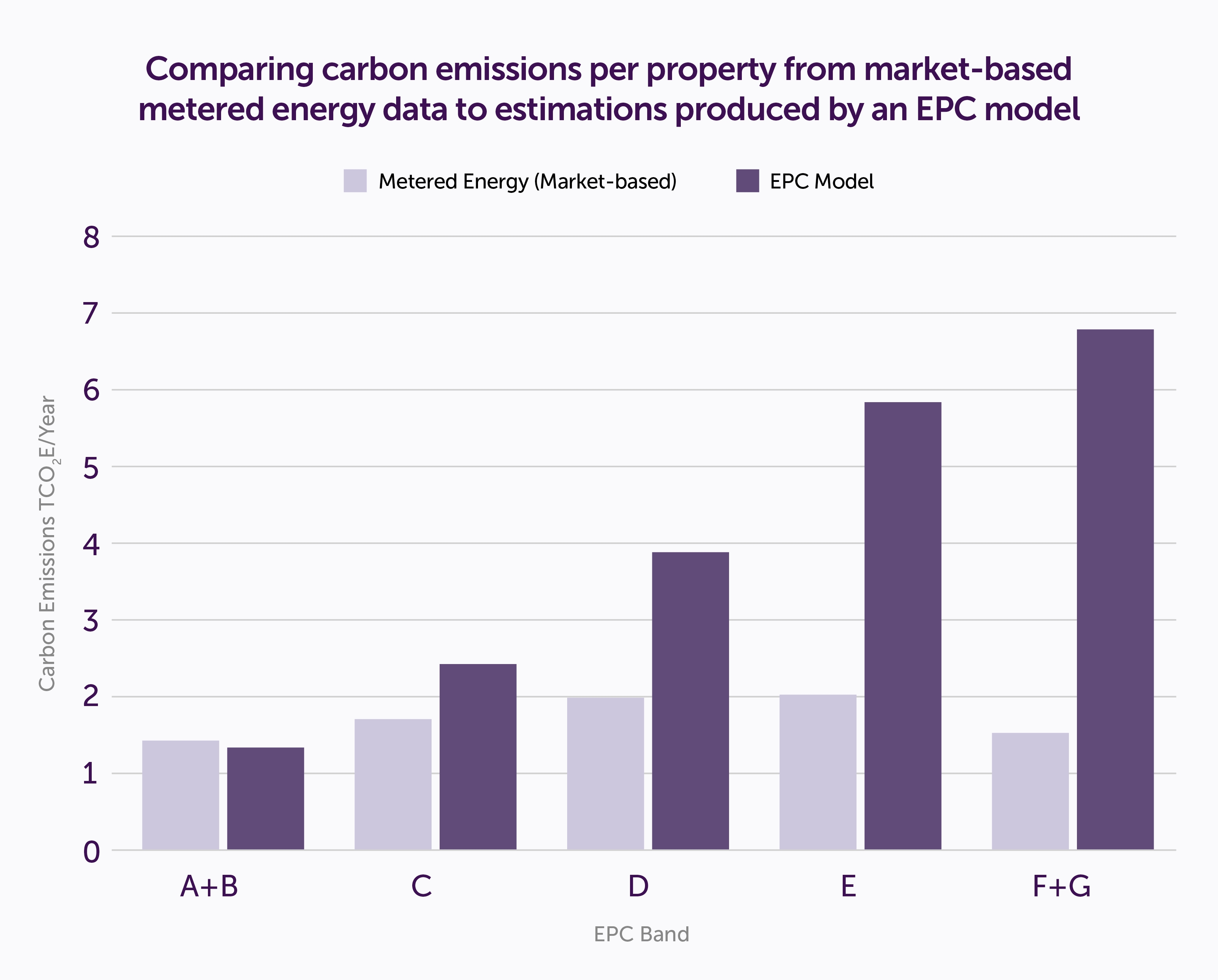11-09-2025
7 min read
Your home's EPC: is it telling the whole story?

Team Atom
At Atom, we’re committed to helping the UK achieve its net-zero ambitions. We have our own target to be carbon positive from 2035, meaning that we’ll be taking more carbon out of the atmosphere than we’re responsible for emitting. To make that happen we know that accurate information around carbon emissions is essential to making real progress. That’s why we recently conducted a trial in collaboration with Experian to test the data that we - and most other people - rely on to understand carbon and energy use, and what we found might surprise you.
The problem with EPCs
Energy Performance Certificates (EPCs) are widely used to estimate a home’s energy efficiency as well as to suggest improvements you can make, known as retrofitting, to reduce the cost of heating and powering your home. They are also widely used by banks, government and many others to estimate the carbon emissions from homes and commercial buildings, despite not being designed for this purpose. Our study with Experian, with help from Durham University, compared EPC estimates with actual meter readings from over 1000 homes and revealed a significant discrepancy between the actual readings and the models that use EPCs to predict energy use. We found that the models based on EPCs that we and lots of other banks use to estimate carbon emissions from homes are likely over-reporting the emissions by as much as 50%.
Even more surprising, our data showed that the actual carbon emissions from the most energy-efficient properties (EPC A-C) were not significantly lower than those from less efficient properties (EPC D-G), as is widely believed. This suggests that EPCs may not be accurately reflecting real-world energy use. Experts at University College London (UCL) Energy Institute observed a similar pattern in a much larger national dataset, further questioning the reliability of current EPC methodology.

So what does this mean for me?
This doesn’t mean your efforts to be more energy-efficient are in vain, as retrofitting your home to ensure it’s warmer is often worthwhile. However, it is important that your actions are informed by your actual energy usage. Installing a smart meter can be a great way to keep track of your usage and identify small changes you can make to reduce your costs (How to use a smart meter | Smart Energy GB). Lowering your energy consumption and switching to a green energy tariff also leads to reduced carbon emissions. Based on our study, focusing on the energy source and heating methods for your home appears to be at least as crucial as aiming for a high EPC rating.
If current data being used by banks like us and the Government is leading to over-reporting the impact our homes have on the environment, it could mean that the cost and time needed to reach net zero targets might be significantly less than previously thought. This is good news, but it also means we need to focus our efforts more effectively on the things that matter, like energy usage and source.
Taking action
At Atom, we’re not just highlighting a problem; we’re actively working towards a solution. We’re collaborating with industry groups like Bankers for Net Zero (B4NZ) and urging the government and other banks to:
- Share their data for better clarity: As a first step, Atom, Experian and B4NZ are urging other banks, central Government and the Bank of England to share their data, enabling the industry and Government to gain a clearer understanding of actual emissions and the true cost of the transition to net zero. This greater transparency could enable financial institutions to focus efforts on areas where emissions reductions will have the most impact, contributing more effectively to the UK’s net zero ambitions.
- Accelerate EPC reform and use real data: It’s time to shift from estimated to actual energy performance data, using anonomyised utility bills or smart meters. Accurate EPCs and more rigorous assessments of building standards will give homeowners and the finance industry more confidence in their decisions.
- Focus on zero-carbon energy: As a growing number of mortgages go to first-time buyers and new builds, there’s a huge opportunity to align lending with net-zero ambitions. We need to ensure we’re financing genuine low-carbon initiatives and focusing on clean heat and power for all.
What you can do?
While we work with the industry and Government to improve data and policy, you can continue to make a difference:
- Consider your energy source: Using clean energy is vital to reach net-zero and is often cheaper than changing the fabric of your home. Check if your current provider offers green tariffs or use comparison websites like Money Saving Expert to explore options for renewable energy suppliers.
- Think about your heating: Look into low-carbon heating solutions if you’re considering home improvements, such as solar panels or heat pumps. While they can be expensive up front, they can save you money on heating bills in the long run.
- Use a smart meter: If you can, have a smart meter installed in your home. While they don’t automatically reduce energy bills, they provide a more accurate picture of your energy use and you can access cheaper energy through time-of-use tariffs and other initiatives linked to electric vehicles
- Stay informed: Follow developments in energy efficiency and Government initiatives, where you could be entitled to grants to make improvements to the energy efficiency of your home.
Atom employee, Liam Dexter, has seen a huge saving in energy bills having switched to an Octopus tariff and smart meter:
“Switching to a smart meter and an agile tariff with Octopus Energy has been a game-changer for our household budget. We’ve seen a significant drop in our electricity bill, especially because when our electric car charges at the lower night rate, our whole house benefits from that same reduced rate. We usually stick the dishwasher or washing machine on at the same time to use the cheaper energy. It’s remarkable how little we now pay for charging two cars, it’s around £15 extra a month, compared to the hundreds we used to spend on petrol.”
Edward Twiddy, Atom’s Director of ESG, commented on the reasons for revealing these findings:
“The UK has made real progress in addressing the challenge of decarbonising its economy but continuing that momentum will require better data and more targeted action. This study reveals that EPC ratings do not reliably reflect actual household emissions, with inaccurate data being a clear hindrance to reaching net zero. If most households are using similar amounts of energy, the focus should be on where that energy comes from and then how to make that clean energy as affordable as possible.
“The findings of this trial have important implications for green lending, banks’ carbon reporting, and the future use of EPCs in measuring and reducing residential emissions. Atom is collaborating with organisations such as B4NZ to engage with other banks and policymakers on the reforms needed to drive meaningful change. As the lenders of billions of pounds to households and businesses, banks like Atom have an enormous role to play in meeting the UK’s net zero commitments.”
At Atom, we’ve gone further than any UK bank by pledging to become climate positive by 2035, which means our actions will actively remove more carbon from the atmosphere than we have been responsible for emitting.
This study is a vital step in ensuring our actions, and those of the wider industry, are built on accurate, real-world data, ultimately helping us all reach a net-zero future more effectively and efficiently.
